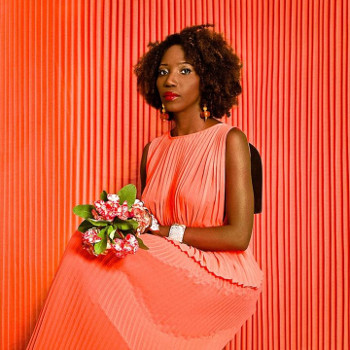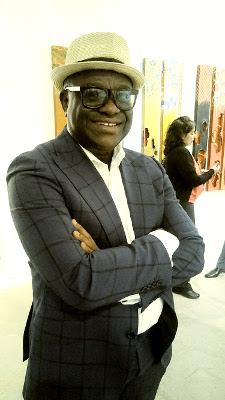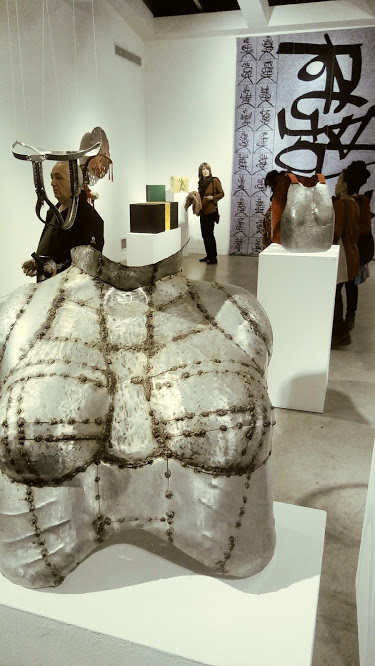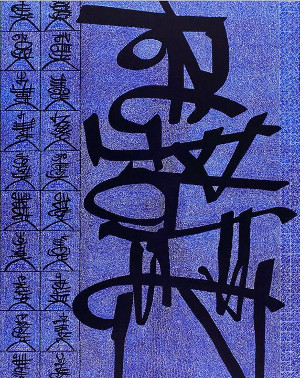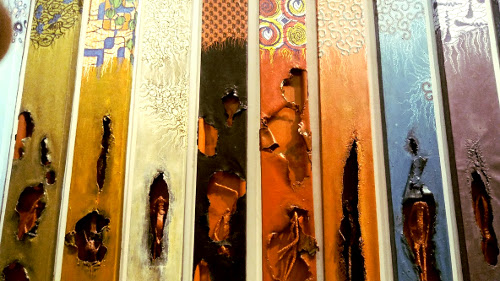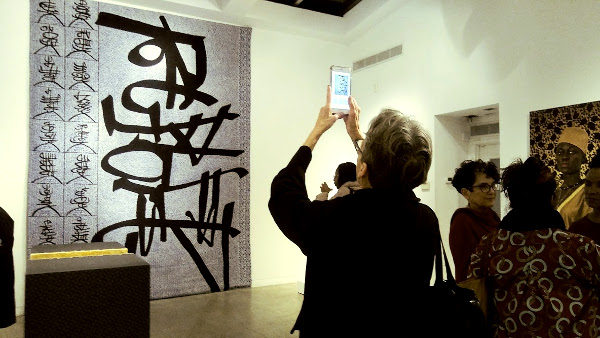CURATOR'S CHOICE SM
Exhibition Reviews
| Home | | Museum
Guide | | International |
| Theater |
by Kamoier Williams
| South
Asia Joins Africa in New York:
The Aicon Gallery is located at 35 Great Jones Street
in Manhattan's East Village and opened as a gallery space in 2002.
I had a conversation there with Curator Awam Kmpka on November 30
at the opening of “Interwoven Dialogues: Contemporary Art from
Africa and South Asia." Kmpka related, "The owner of this
gallery and I have been talking for a while about possible collaborations.
We said, 'Why don't we have a south to south conversation where it's
Africans and Asians and not just Europeans all the time?'" That
was the impulse to develop this collaboration of artists in this ongoing
exhibit. The exhibit features works comprised of ten artists, some of whom are from Nigeria, Morocco, Senegal, Ghana and Algeria. The others are from India and Pakistan. Some of the African artists were chosen by Kmkpa and brought into this exhibition after previously working with him. The press release says, "The exhibition is anchored around two concepts – (1) an exploration of the tactile quality of fabric and other related material and how it affects image-making and, (2) the design elements that infuse African and South Asian art which are in turn informed by a broad-ranging, innovative pattern-making traditions." "All of the artists are superstars in their own right, but they have never been put together like this in such a small scale. We use textiles as the motif and it shows how they are designed to make statements about the human condition," Kmkpa added.
As you walk into the galleries from door, you are greeted
by "Adama (Adama Paris)," a pigment inkjet print piece made
in 2013 and used as the face of the exhibition. It was created by
one of the African artists, Omar V Diop of Senegal.
Not only is Awam Kmkpa this exhibition's curator, but
he is a renowned Nigerian actor, author, documentary filmmaker, a
dramatist and a global visiting associate professor of dramatic arts
at NYU Tish School of the Arts, teaching drama and curatorial theory.
This is a peice by Naiza Khan (b. 1968, Pakistan). "She lived in London, and her work is a statement on the male gaze of the female body" Kmpka said, referring to this armory pieces called "Body Bust", with "Body-bullet" platformed close by. Both peices are made of galvanized steel. She also had two suspended pieces called "Chasity Belt I and II" made with metal and fabric zips. While the exhibition featured seven of Naiza's pieces,
the gallery included additional photographs on their website of Khan
posing with the work. Kmpka adds, "It's addressing how some men
like the idea that a woman's body should be contained."
"This man works with divine calligraphy. He is using Arabic caligraphy artistically and keeps textile as the template." Kmpka was referring to "La Prière de l'Absente," a large fabric composition designed in 2014 by famed Algerian artist Rachid Koraïchi. The hanging work is roughly twelve feet by nine feet in size and its title, "La Prière de l'Absente," translates from French to "The Prayer of the Absentee.”
We also admired the two portraits by Omar Victor Diop of Senegal, creator of the exhibition's cover photo, and his two additional inkjet prints on Hahnemuhle paper. Kmpka explained, "The subject of these is not just the human being, but it is also the use of patterns and geometries. When he sets up his studio, he rehearses the space and lets the patterns determine what the subject will wear, and how they will pose." My conversation with Kmpka really left a heavy impression when he explained to me the context of Peju Alatise's peice titled "Lost". It's comprised of mixed media pieces created in 2015 that combine painting and sculpture.
He said, "Her work is mostly about women's oppression.
This piece is about the young girls who were kidnapped in Nigeria.” After my talk with Kmpka, I had a clearer outlook on
the exhibition and I walked around the gallery to get a closer study
of each piece.
The conversations I heard were a personification of the "Interwoven Dialogue" that Aicon Gallery and Awam Kmkpa wanted to achieve. They truly created an event to influence people of different races, ages, professions, and interests whether their interests lie in politics, intricate artistic designs, embroidery techniques or environmental concerns. Every discussion led back to one answering one underlying concern: How do you feel about the current condition of humanity? These are all artists featured in the exhibition. IF YOU GO |

